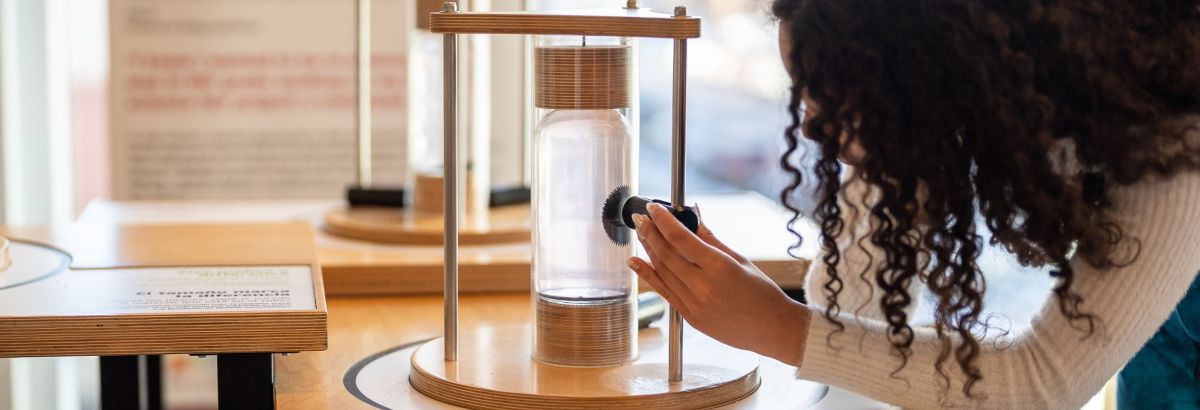
Scheduling Information
Now booking 2024-2025 field trips. Call 406-541-8971 or email caitlin.ervin@umontana.edu to schedule a visit or request more information.
Field trips must be scheduled a minimum of two weeks in advance of the requested date. Guided field trips may take place between 10am and 6pm, Tuesday-Friday, according to spectr老虎机攻略's availability. Museum Exploration visits may be requested between 10am and 6pm Tuesday-Saturday. No field trips are scheduled on Mondays. Field trips are limited to 60 students at a time.
Location
All field trips take place at 455 East Main Street, Missoula, Montana, 59802. Indoor lunch space is limited and must be requested in advance. Bus parking is not available.
Cost
Museum Exploration: free
Guided Field Trips: $6.50 per student with a minimum of $100
Teachers, volunteers, parents, and paraeducators are free.
Scholarships
Needs-based scholarships are available, apply online.
Museum Exploration Field Trip
Groups can schedule a visit to spectr老虎机攻略's museum during public hours for a self-guided experience at no cost. The exhibits and activities featured in our field trips are curated to inspire a culture of learning and discovery, and are facilitated by trained educators who serve as role models by demonstrating a passion for science and pathways to higher education.
Guided Field Trip
Guided field trips are designed to give students the opportunity to explore our museum independently to make their own discoveries, as well as work with our educators to learn science concepts through guided experiments and activities. While each field trip topic explores different themes, students and educators will model the scientific method and are encouraged to be curious learners. Field trip curricula are designed to meet NGSS, but may be adapted to all ages and abilities.
Groups can book a classroom experience that includes 45 minutes of private, educator-led experiments, and 45 minutes of museum exploration. Classroom activities are designed to support Next Generation Science Standards.
Group leaders choose one of the following themes for their classroom experience:
-
Anatomy: What systems does the human body have and how do they work? Students will participate in experiments to learn about organs and the systems of our bodies.
- Formative assessment: Educators and students will refer to terms and concepts involving anatomy and physiology.
- Summative assessment: Students will lead discussion and will build anatomical models using terms and science concepts to demonstrate understanding.
-
Chemistry: What is a chemical and how do materials interact? Students will learn how to identify and create chemical reactions.
- Formative assessment: Educators and students will refer to chemistry terms and concepts, such as molecule, chemical, atom, proton, electron, neutron, reaction, and states of matter, and use the scientific method during experimentation.
- Summative assessment: Students will lead discussion using terms and science concepts during experiments and upon reflection
-
Electricity: What is electricity and how does it work? Students will build circuits and explore models electricity.
- Formative assessment: Educators and students will use and refer to concepts such as: electron, proton, atom, circuit, magnetism, charge, and electromagnetism.
- Summative assessment: Students will lead discussion using terms and science concepts to demonstrate understanding throughout activities.
-
Physics: What forces impact us and our universe? Students will learn physics theories and test forces.
- Formative assessment: Educators and students will refer to physics terms and concepts, such as gravity, inertia, the conservation of angular moment, centripetal force, and/or identify celestial bodies, constellations, and moon phases.
- Summative assessment: Students will lead discussion using terms and science concepts while building models to demonstrate understanding.
-
Wildfire: What causes wildfires and how do they impact flora and fauna? Students will explore the chemistry of wildfire and understand its impact.
- Formative assessment: Educators and students will refer to terms and concepts involving the science of wildfires, natural hazards, weather, and climate.
- Summative assessment: Students will lead discussion using terms and science concepts to demonstrate understanding throughout activities.
spectr老虎机攻略 Field Trip Additions
Thanks to our friends at the your students can learn all about bugs and meet special bug ambassadors as part of your spectr老虎机攻略 field trip at 455 East Main Street.
$60 program + $15 admin fee: Drop-in Bug Encounter Cart
During your class's open exploration time in the museum, the Missoula Butterfly House & Insectarium will join you at the Discovery Bench with a line up of Bug Ambassadors to meet and hold. This is an informal opportunity for students to drop in and meet the bugs as they explore the exhibits.
$100 program + $15 admin fee: Private Bug Survival Skills Field Trip
Your students will learn all about the special adaptations and behaviors arthropods use to survive in the wild through this formal program. Live Bug Ambassadors are an integral part of each program that also features games and activities facilitated by a knowledgeable and enthusiastic educator from the Missoula Butterfly House & Insectarium.
Cancellation Policy
A $50 cancellation fee is applied to cancellations made within 24 hours of field trip visit.

Sponsorships
The Gallagher foundation is sponsoring free field trips!
Title I schools qualify for free field trips to spectr老虎机攻略. Apply here.
For more information, contact Caitlin Ervin or call 728-STEM.
